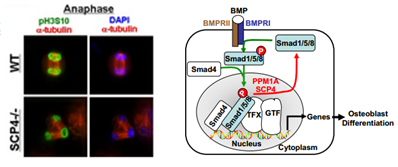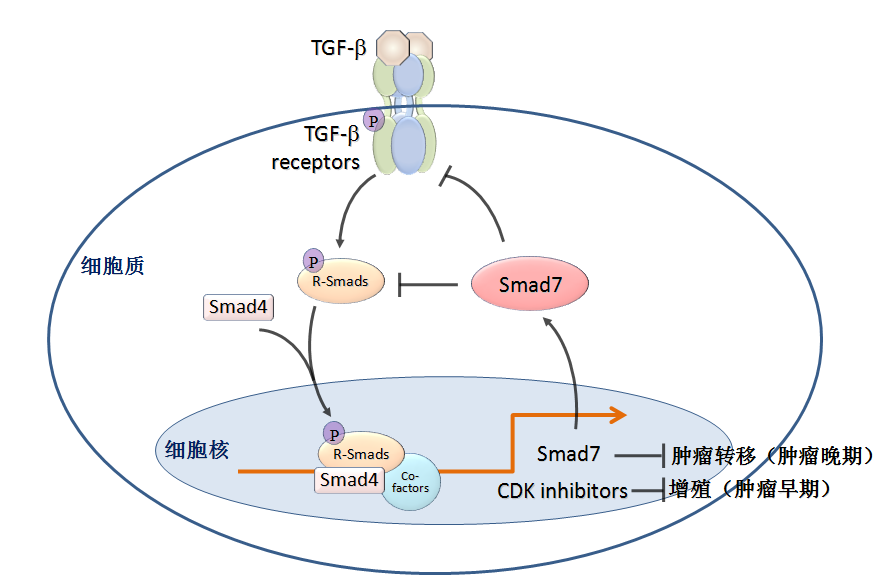The research of feng lab is aimed at elucidating the underlying mechanisms and interplays among protein modifications, signaling pathways and gene transcription as well as understanding their roles in cell proliferation, tissue differentiation and pathogenesis of human diseases. Our current research projects include:
SMADs are evolutionarily conserved signal transducers and transcription factors controlling functions of TGF-β/BMP. A large number of inactivating mutations on SMADs have been linked to human cancers and genetic diseases. We address these molecular interactions, requirement and functionality of SMADs in TGF-β/BMP responses using cell biological, genomic and proteomic approaches. We investigate how SMADs mediate transcription and how their actions become terminated. We also study how SMADs as tumor suppressors interplay with oncogenic pathways, with particular interests in pancreatic, breast cancers, and lymphoma using in vitro and in vivo model systems.
TGF-β is a major inflammatory and immune-regulatory cytokine, but the mechanism how TGF-β exerts its actions is unclear. We are interested in investigating the signaling interactions between TGF-β pathway and other cytokine pathways (such as TNF-alpha, IL-1, IL-6 pathways) in immune responses. This area of research may lead to drug discovery for cancer and inflammatory diseases.
Epithelial-mesenchymal transition (EMT) is a process by which fully differentiated epithelial cells undergo a phenotypic conversion and assume a mesenchymal cell phenotype. In physiology state, the EMT associated with wound healing, tissue regeneration, and in pathology state, it associated with organ fibrosis and tumor metastasis.
The mechanism of EMT is still unknown, but TGF-β is considered as the most important factor to induce EMT. This will provide a new target of drug for the tumor or the treatment of fibrotic diseases.
The mechanism of EMT is still unknown, but TGF-β is considered as the most important factor to induce EMT. This will provide a new target of drug for the tumor or the treatment of fibrotic diseases.
Transforming growth factors (TGF-β) and their family members have been implicated in the development and maintenance of various organs, in which stem cells play important roles. Embryonic stem (ES) cells self-renew indefinitely and contribute to derivatives of all three primary germ layers. In order to utilize stem cells for therapeutic applications, it is essential to understand the extrinsic and intrinsic factors regulating self-renewal and differentiation of stem cells. We try to discover the molecular mechanism of the regulation of stem cell renewal and differentiation by TGF-β signaling, through identification of new proteins involved in TGF-β signaling in ES cells.
Recently, a lot of long noncoding RNAs (LincRNAs) were found in cancer, but their function is unclear. As we known, transforming growth factors (TGF-β) play vital roles in cancer development and metastasis. Thus, we would like to combine RNA deep sequencing and functional genomic screening to seek important LincRNA and its binding proteins in TGF-β involved cancer development and metastasis, and then in molecular and cell level to address their regulation mechanism and using mouse model to figure out their biological function.
 |  |
 |  |




